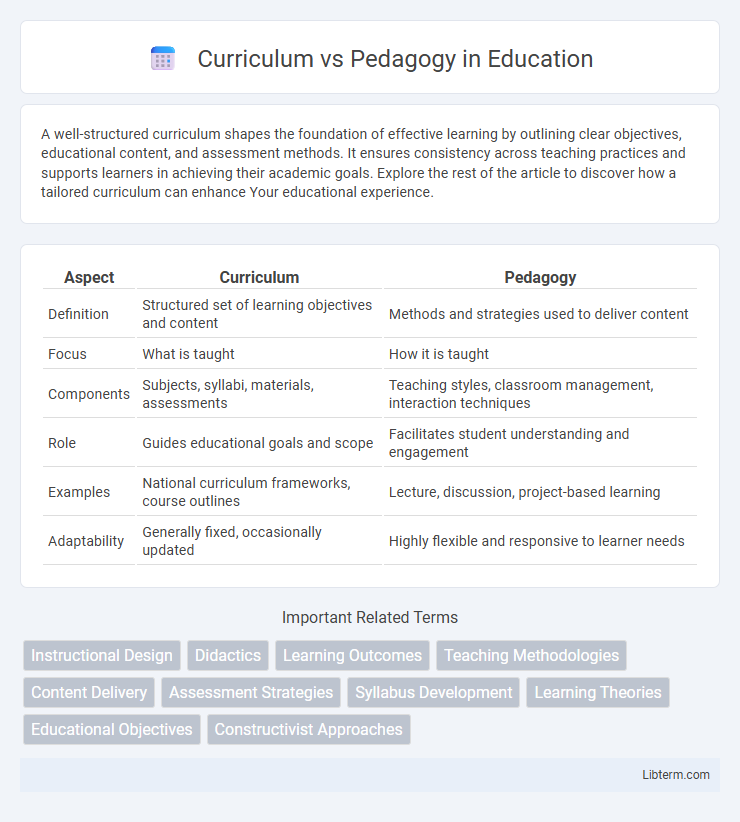A well-structured curriculum shapes the foundation of effective learning by outlining clear objectives, educational content, and assessment methods. It ensures consistency across teaching practices and supports learners in achieving their academic goals. Explore the rest of the article to discover how a tailored curriculum can enhance Your educational experience.
Table of Comparison
| Aspect | Curriculum | Pedagogy |
|---|---|---|
| Definition | Structured set of learning objectives and content | Methods and strategies used to deliver content |
| Focus | What is taught | How it is taught |
| Components | Subjects, syllabi, materials, assessments | Teaching styles, classroom management, interaction techniques |
| Role | Guides educational goals and scope | Facilitates student understanding and engagement |
| Examples | National curriculum frameworks, course outlines | Lecture, discussion, project-based learning |
| Adaptability | Generally fixed, occasionally updated | Highly flexible and responsive to learner needs |
Understanding Curriculum: Definition and Scope
Curriculum encompasses the structured content and learning objectives designed for educational programs, defining what students are expected to learn across various subjects. It includes the planned lessons, materials, assessments, and instructional strategies that shape the academic experience and guide both teaching and learning processes. Understanding the scope of curriculum involves recognizing its role in aligning educational goals with student needs, societal expectations, and policy standards to ensure effective knowledge transfer and skill development.
Defining Pedagogy: Methods and Approaches
Pedagogy encompasses the diverse methods and approaches educators use to facilitate learning, including interactive, collaborative, and experiential techniques tailored to student needs. It involves strategies such as inquiry-based learning, differentiated instruction, and formative assessment to enhance engagement and comprehension. Effective pedagogy adapts to cultural contexts and learning environments, ensuring that instructional practices promote critical thinking and skill development.
Key Differences Between Curriculum and Pedagogy
Curriculum refers to the structured content, objectives, and materials designed for teaching, outlining what students are expected to learn. Pedagogy encompasses the methods and strategies educators use to deliver the curriculum and facilitate student learning. Distinguishing curriculum as the 'what' and pedagogy as the 'how' is essential for effective education planning and implementation.
The Role of Curriculum in Educational Success
Curriculum provides a structured framework that outlines the essential knowledge, skills, and competencies students must acquire to achieve educational success. It guides instructional planning, assessment methods, and resource allocation, ensuring consistency and alignment with academic standards and learning outcomes. A well-designed curriculum fosters student engagement, critical thinking, and mastery of subject matter, directly impacting overall academic achievement and lifelong learning.
How Pedagogy Shapes Learning Experiences
Pedagogy shapes learning experiences by determining the methods and strategies educators use to deliver curriculum content, directly influencing student engagement and comprehension. Effective pedagogical approaches adapt to diverse learner needs, fostering critical thinking and collaboration. This dynamic interaction between teaching practices and curricular goals ensures that knowledge is not only transmitted but meaningfully constructed.
Curriculum Design: Principles and Frameworks
Curriculum design involves structuring educational content, learning experiences, and assessment methods based on core principles such as coherence, relevance, and flexibility to meet diverse learner needs. Frameworks like Tyler's Rationale emphasize clear objectives, organized learning experiences, and evaluation, while Understanding by Design (UbD) focuses on backward planning from desired learning outcomes. Effective curriculum design integrates multidisciplinary standards and cultural context, ensuring alignment with pedagogy to facilitate meaningful knowledge construction and skill development.
Innovative Pedagogical Strategies in Modern Classrooms
Innovative pedagogical strategies in modern classrooms emphasize active learning, student-centered approaches, and technology integration to enhance engagement and critical thinking. Unlike traditional curricula that outline content, pedagogy focuses on the methods and practices of teaching to adapt to diverse learner needs and foster creativity. Strategies such as flipped classrooms, gamification, and collaborative projects transform curriculum delivery, making education more dynamic and effective.
Aligning Curriculum with Effective Pedagogy
Aligning curriculum with effective pedagogy ensures that learning objectives are met through teaching methods tailored to students' needs and cognitive development. A well-designed curriculum provides clear content standards and learning outcomes, while pedagogy adapts instructional strategies such as differentiated instruction, formative assessment, and active learning to enhance engagement and comprehension. Integration of curriculum and pedagogy leads to improved student achievement by fostering critical thinking, deeper understanding, and practical application of knowledge.
Challenges in Balancing Curriculum and Pedagogical Practices
Balancing curriculum and pedagogical practices presents challenges such as aligning standardized content with diverse student needs and learning styles, which can limit instructional flexibility. Educators often struggle to adapt rigid curricula while maintaining effective teaching methods that promote critical thinking and engagement. Resource constraints and varying teacher expertise further complicate the integration of curriculum goals with innovative pedagogy.
Future Trends: Integrating Curriculum and Pedagogy
Future trends in education emphasize the seamless integration of curriculum and pedagogy to create adaptive, personalized learning experiences driven by data analytics and artificial intelligence. Innovative approaches focus on competency-based education that aligns content delivery with individual learner needs, promoting critical thinking and creativity through project-based and experiential learning models. Technology-enhanced instruction enables real-time feedback and dynamic curriculum adjustments, fostering deeper engagement and improved learning outcomes across diverse educational settings.
Curriculum Infographic

 libterm.com
libterm.com